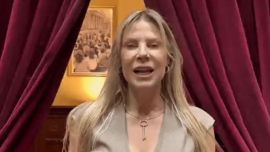All’s fair in love, war and electoral politics, especially when you are someone as fiercely ambitious as Sergio Massa. He became economy minister when nobody else, apart from Silvina Batakis, wanted that thankless job because he knew it would provide him with the power and money he needed to win enough votes to reach the presidency. To put one over on his rivals, Javier Milei and Patricia Bullrich, he is now making lavish use of the freshly-printed – but soon to be worthless – banknotes the government is churning out with gay abandon. The possibility that he will be among the principal victims of the economic bomb he is putting together does not bother him in the slightest. As far as Massa is concerned, the short term is all that matters. He takes it for granted that, once in office, he will be able to do whatever it takes to repair the damage he is causing.
Just what the economy minister who wants to be president has in mind is anyone’s guess. It all depends on the circumstances. He used to be considered a friend of many North American business tycoons and politicians who are regarded as staunch right-wingers, but of late he seems to have sidled away from them. For now at any rate, he thinks it suits him to make out he is a fervent Kirchnerite who takes seriously the words of wisdom uttered by people like Cristina Fernández de Kirchner, Axel Kiciloff, and the rest of the mob, plus such lorry-driver union heavies as Hugo and Pablo Moyano. He probably despises the lot of them but assumes it is in his interest to pretend otherwise. If he reaches his objective, they could be in for some unpleasant surprises; campaigning for office is one thing, wielding power is another.
Argentina is used to shape-shifting politicians. On starting his stint in office Carlos Menem – who on his way to the top had posed as a brainless populist who on inauguration day would award all workers with a massive pay rise – asked a big business conglomerate to take charge of the economy and, when its plan went awry, turned fully neoliberal and, tutored by Domingo Cavallo, gave Argentina almost a decade of inflation-free stability and laid the foundations for what, had it lasted, could have been a long period of sustained economic growth.
If elected, Massa, who started his political life as a keen free-marketeer, would surely be tempted to emulate the one-time “ayatollah of the pampas” whose metamorphosis made him something of an international star. Presumably, it is public awareness that he enjoys changing course that has enabled him to be in there with a chance despite his truly disastrous performance as economy minister and his willingness to pile up problems he himself may have to face in the near future.
If Argentina were what politicians wistfully call a “normal country,” neither Massa nor anyone else representing the Kirchnerite dispensation would win more than a small fraction on the votes in a general election but, as we are constantly being reminded, in this part of the world people are unusually prone to let themselves be ruled by oddballs or outright crooks. Of the three presidential candidates who remain in the running, only Bullrich would pass muster in most consolidated democracies though, given what is going on in the United States, in the land of the free local versions of Massa or Milei could conceivably make it into the White House. Unfortunately, Bullrich’s campaign, which stalled in the days following the primaries, has yet to acquire much momentum. This could quickly change, but unless it soon does the country will end up having to choose between a notoriously unscrupulous character nobody trusts and a crank who says he consults his canine family-members before making important decisions.
To squeeze out Argentina’s answer to Margaret Thatcher, Massa and Milei have made an ad-hoc alliance. Political operatives linked to the Peronist candidate have joined the still makeshift organisation that is forming itself around the libertarian and helped out during the primaries by making sure he was not deprived of too many votes. They did this because it was understood that most came at the expense of the Juntos por el Cambio coalition, but since then political bean-counters have shown that Milei also did very well in poverty-stricken districts, both in the Buenos Aires Province slum belt and the ‘feudal’ parts of the north, places Kirchnerites thought were theirs for keeps.
This confronts Massa with a dilemma. He know that, like Donald Trump and Jair Bolsonaro, Milei thrives on opposition and, when attacked, becomes electorally stronger, so if he orders his Peronist foot-soldiers to give him the standard treatment, they could well end up by convincing people that he really does represent a valid alternative to whatever it is they still have to offer. What is more, drawing attention to the differences between Milei’s worship of free markets and their own espousal of kleptocracy combined with an alleged devotion to the wellbeing of the desperately poor would not be of much use. If anything, it could help persuade malcontents that, after a long reign during which Argentina went backwards, Peronism is about to be replaced by anarcho-capitalism.
This is a prospect that some politicians, among them Mauricio Macri, are taking seriously. While Massa is evidently determined to fight on, it must have crossed his mind that, thanks largely to his own failure and the truly wretched performance of Cristina Fernández de Kirchner, Alberto Fernández, Kiciloff and company, as well as the widespread feeling that Juntos por el Cambio is too weak and too self-obsessed to do anything useful, enough people could vote for Milei to make him the country’s next president.
In that case, two old rivals, Macri and Massa, would have to decide what to do about it. Until a couple of weeks ago, it looked as though the former president would be best placed to take advantage of a situation in which Argentina would be ruled by a political novice who would need a great deal of help, but then Massa started edging closer to him. By doing so, he is hedging his bets by providing himself with an opportunity to play a prominent role, whether behind the scenes or on front stage, in a hypothetical administration headed by Milei.



















Comments